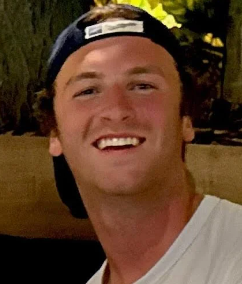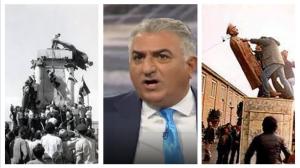

 (NCRI) reported that as Iran’s nationwide uprising, now in its fifth month, threatens to topple the medieval ruling tyranny, Reza Pahlavi, the son of the deposed shah, replies to a series of questions and tries his hand at casting aspersions at the MEK. The MEK stressed that the MEK had been open to dialogue but...
(NCRI) reported that as Iran’s nationwide uprising, now in its fifth month, threatens to topple the medieval ruling tyranny, Reza Pahlavi, the son of the deposed shah, replies to a series of questions and tries his hand at casting aspersions at the MEK. The MEK stressed that the MEK had been open to dialogue but... (NCRI) reported that as Iran’s nationwide uprising, now in its fifth month, threatens to topple the medieval ruling tyranny, Reza Pahlavi, the son of the deposed shah, replies to a series of questions and tries his hand at casting aspersions at the MEK.
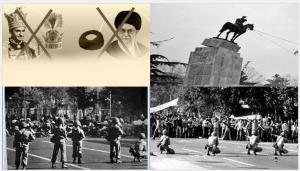
The MEK stressed that the MEK had been open to dialogue but neither with the clerical dictatorship nor with the remnants of the notorious Shah’s dictatorship.MEK recalled how millions of Iranians sacrificed their lives to end the shah’s dictatorship.
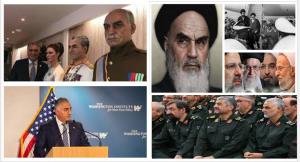
Who is Reza Pahlavi and what does his record show? At no time during his brief political career, has Reza Pahlavi ever criticized the atrocities of his father and grandfather. Quite to the contrary, he has presented an “Alice the Wonderland” picture of Iran.
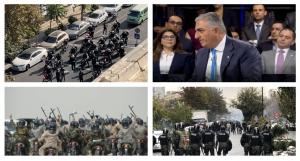
Demonstrating that he relies on the IRGC and the Basij as key elements of his regime change strategy, during a talk show with Iran International in 2018, he clearly said: “I am in bilateral contacts with the (regime’s) military, the IRGC and the Basij.
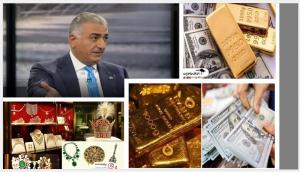
How much money did he and his family steal from the Iranian people when they left Iran in 1979? He once said 26 million dollars, but according to the New York Times on January 1, 1979, “Bankers say that a substantial part of the $2 billion to $4 billion.
Shah: “Anyone who opposes the constitution, the imperial system, and the White Revolution should be in prison or easily leave the country forever.”
— NCRI
PARIS, FRANCE, January 24, 2023 /EINPresswire.com/ — In an article, the Foreign Affairs Committee of the National Council of Resistance of Iran (NCRI) stated that as Iran’s nationwide uprising, now in its fifth month, threatens to topple the medieval ruling tyranny, Reza Pahlavi, the son of the deposed dictator Mohammad Reza Pahlavi, who millions of Iranians booted from power some 44 years ago, took part in a tailor-made interview on January 16, with a dubious television channel, Manoto TV, to lash out at Iran’s principal, and best-organized opposition, the People’s Mojahedin Organization of Iran( PMOI/MEK).
Manoto TV has been widely criticized by Iranians for questionable practices, like broadcasting unblurred footage that endangers the security of protesters inside Iran, airing hateful and divisive reports that target Iran’s national minorities, and producing falsified and biased documentary reports.
Reza Pahlavi’s self-serving replies to a series of softball questions by the presenters were a segway to giving him a platform to try his hand at casting aspersions at the MEK.
Responding to an editorialized question about whether “the unpopular” MEK would be willing to engage in dialogue with other opposition groups, Shah’s now elderly son, cast doubt on the democratic credentials of the MEK, preposterously claiming that such dialogue would prove problematic for the organization.
In a crushing response on the MEK’s official website, the organization’s spokesperson ridiculed Shah’s son’s pretenses of democracy, noting that the countless atrocities perpetrated by Khomeini and Ali Khamenei have emboldened Reza Pahlavi to demand the overthrown throne from the Iranian people as if they are indebted to him.
The MEK spokesperson stressed that the MEK had been open to dialogue but neither with the clerical dictatorship nor with the remnants of the notorious Shah’s dictatorship. He further recalled how millions of Iranians risked while thousands of them sacrificed their lives to end the monarchial dictatorship once and for all.
Emphasizing that Pahlavi has illegitimately stuck to his title of “Prince” for four decades, the MEK Spokesperson called on him to first return the billions of dollars his father stole from the nation, denounce the atrocities committed by his grandfather and father and distance himself from the IRGC and Basij, which he had previously praised as guardians of Iran’s territorial integrity and law and order in society.
For the overwhelming majority of Iranians, the Shah’s execution and imprisonment of pro-democracy opponents and the destruction of democratic institutions paved the way for the mullahs to usurp the leadership of the 1979 popular revolution and assume power.
In this sense, the mullahs’ regime is seen as the extension of the previous dictatorship and Khomeini, and now Khamenei, as the true heirs of the Pahlavis.
Who is Reza Pahlavi and what does his record show?
At no time during his brief political career, has Reza Pahlavi ever criticized, let alone condemn, the atrocities of his father and grandfather.
Quite to the contrary, at every opportunity, he has presented an “Alice the Wonderland” picture of Iran under the monarchic dictatorship. Sugarcoating the Pahlavis’ crimes and perverting Iran’s history in bogus documentaries.
But as detached and ignorant as Pahlavi might be about Iran’s history, he cannot and will not airbrush what is historically documented and very much alive in the minds of millions of Iranians.
Post 1979 Revolution, while the Shah and his family fled Iran with billions of dollars, Reza Pahlavi lived a lavish life, much like his father and grandfather, albeit in the United States.
Aside from several failed associations with so-called opposition entities such as the National Council of Iranians, Qoqnus, and Farashgard, there is nothing else on his resume.
His lack of a socio-political foothold inside the country notwithstanding, Pahlavi’s entire political career consists of posting sporadic and politically-expedient tweets, Facebook and Instagram posts, taking part in self-promoting television interviews, and heaping praise on the Islamic Revolutionary Guards Corps (IRGC) and its paramilitary offshoot, the Basij as partners in the campaign to topple the regime and preserve law and order in post-clerical Iran.
On Persian-speaking media and social media, there are dozens of videos that manifest his ever-changing political tendencies throughout the years. Varying from declaring that “regime change is not included in his set of the alphabet”, to becoming a fierce advocate of regime change.
Moreover. Reza Pahlavi has refused to clarify his positions on any serious issue such as the demands of Kurdish and other ethnicities for autonomy within the territorial integrity of Iran. Similarly, he has sidestepped the question about the form of the future government in Iran, keenly aware that the Iranian people will in no way stand for a rebranded Monarchic system.
While he tries hard to say that he is open to the idea that people should decide about the future form of governance in Iran, he refuses to withdraw his claim to the throne. What’s more, her mother has even gone further and appointed his daughter as the heir to his son. (Interview with an Italian newspaper)
There as several serious questions to which Reza has not offered any replies. For example:
Where does he get his legitimacy from? Being the son of a deposed dictator? On what basis he claims that his role has to be above all political parties?
Does he believe in the right of different nationalities to autonomy within the territorial integrity of Iran?
Why does he praise his father’s dictatorial one-party system? Is he prepared to condemn the executions and torture of political opponents under his father’s rule? What does he say about the fact the Pahlavi dynasty took power via a coup d’état initiated by the British?
What is his position about Iran’s popular prime minister Dr. Mohammad Mossadegh overthrown by an MI6 and CIA coup d’état that restored his father to the throne?
How much money did he and his family steal from the Iranian people when they left the country in 1979? He once said 26 million dollars, but according to the New York Times on January 1, 1979, “Bankers say that a substantial part of the $2 billion to $4 billion that, according to estimates, has been transferred from Iran to the United States in the last two years belongs to the royal family.”
Demonstrating that he relies on the IRGC and the Basij as key elements of his regime change strategy, during a talk show with Iran International in 2018, he clearly said: “I am in bilateral contacts with the (regime’s) military, the IRGC and the Basij. We are communicating. They are signaling their preparation and express willingness to align with the people.”
“The most important component among all factors is the role that the military and paramilitary forces can play in this transition (regime change). That is why soldiers and militiamen are the target audience of some of my messages,” Pahlavi told a meeting on December 18, 2018. “Of course, the individual who is a member of the IRGC and the Basij, those who are disappointed today like the rest of us, they have a place in the future, and they should.
They must have a place. They should know that the very force to guarantee Iran’s future security and stability are actually themselves.
I say this based on my direct contacts with representatives of Iran’s military and paramilitary forces that happen on a daily basis. These are increasing every day.”
The ranks of the so-called Iranian monarchists being penetrated and vulnerable to the regime’s Ministry of Intelligence and the IRGC is not a secret anymore.
Hashem Khastar, a leader of a teacher’s union in Iran, who is currently in prison for his opposition to the clerical regime said that IRGC had asked him not to work with the MEK and urged him to contact Reza Pahlavi (reference is required)
In January 2010, an article appeared in the Los Angeles Times, describing a former officer, Mohammadreza Madhi, in the Revolutionary Guards’ Intelligence Organization who fled Iran and wanted to form the broadest coalition of opposition forces in the diaspora.
Claiming he has about 10,000 men of rogue IRGC elements behind him, he succeeded to beguile many Iranian activists, mostly monarchists to associate themselves with his lead.
A year later, Madhi appeared in the ‘Diamond for Deception’, a documentary aired by Iranian state television just a few days before the second anniversary of 2009. The documentary described Madhi as “a double agent” who infiltrated the Iranian opposition movement and foreign intelligence units. As is the father, so is the son.
According to the book “The Shah,” Mohammad Reza ridiculed his father in private conversations, calling him “a thuggish Cossack” who did little as king. He ascended to the throne on September 16, 1941.
In the early 1950s, the popular nationalist prime minister, Dr. Mohammad Mossadeq, began to introduce democratic reforms, including laws securing the freedom of the press and protecting women’s rights. He also led a movement to nationalize Iran’s oil resources.
The Shah joined the reactionary clerics to push back against Mossadeq’s democratic reforms while helping the British to resist his campaign to nationalize oil. In August 1953, the Shah, allied with the clerics led by Kashani and Anglo-American intelligence agencies, conducted a coup against the democratically elected and popular Mossadeq.
After overthrowing the sole democratic functioning government in Iran’s history, the Shah began ruling with an iron fist, creating a despised secret police called the SAVAK, imprisoning reformists, clamping down on the media, killing opponents, and gradually a one-party system in Iran.
Torture and execution by Shah’s secret police, SAVAK, is part of Iran’s unhealed wounds and unforgettable history. On March 3, 1975, the State-run newspaper “Etela’at” published Shah’s speech regarding the declaration of Iran’s one-party system.
The headline read: “His Majesty declared the formation of the single-political-party.” The sub-headline continues: “Millions have joined the Resurrection of Iran.”
Highlighting important parts of Shah’s remarks, “Etelaat” newspaper read:
“From now on, only one party will have the right to political activity.” “The name of Iran’s single party will be “National Resurgence” or “Resurrection of Iran.”
Shah: “Anyone who opposes the constitution, the imperial system, and the White Revolution should be in prison or easily leave the country forever.”
Shah: “We expect that everyone who has reached the legal age to vote, will immediately clarify his national duty and either join this organization or clarify his position.”
Historic quotes.
The Shah was not shy about sharing his reactionary, superstitious and bizarre religious views, even with foreign reporters. He said: “I’m not entirely alone, because a force others can’t perceive accompanies me.
My mystical force. Moreover, I receive messages. I have lived with God beside me since I was five years old. Since, that is, God sent me those visions.” (Interview with Italian journalist Oriana Fallaci, October 1973).
For decades, the Shah and his secret police SAVAK brutally murdered and tortured political activists and intellectuals, including authors, academics, artists, and poets.
In November 1976, Amnesty International quoted a former prisoner as describing Shah’s torture methods, including beatings, hanging upside down, rape, electric shock, pulling nails, pulling teeth, and using a hot iron rod to burn the mouth. “A young man was killed this way,” the prisoner told AI.
An Amnesty International report by a delegation sent to Iran in 1972 said of the findings about Shah’s prisons that some prisoners’ bodies were burned, which paralyzed them. A prisoner told the delegation: “I saw Behruz Tehrani die near me in the torture room.”
US media reported torture is a “national pastime” for the Shah. (The Village Voice, November 14, 1977).
“The Shah of Iran,” said Martin Ennals in the introduction to Amnesty International’s Annual Report for 1974-5, “retains his benevolent image despite the highest rate of death penalties in the world, no valid system of civilian courts and a history of torture which is beyond belief.” The total number of political prisoners for 1975, stated the report, “has been reported at times throughout the year to be anything from 25,000 to 100,000.”
The vast bulk of the population is desperately poor, undernourished, and uneducated. In Quri-Chai, the northern slums of Tabriz, there is only one school for 100,000 children. (The Village Voice, November 14, 1977).
According to media reports, Shah’s torturers were as brutal as they get. Former prisoners recall whipping, breaking fingers one by one, and raping daughters in front of fathers.” (The Village Voice, November 14, 1977).
The Shah had also extremely reactionary and offensive views on women. In an interview with Barbara Walters, on April 6, 1977, Walters asked the Shah: “Do you think that women are equal to men?” The Shah said after a long pause: “Well there are cases, sure. But on average, [no]. I repeat again, where have you produced a top scientist?”
Echoing the mullahs, the misogynist Shah told an Italian journalist that according to his Islamic religion, “when a wife is ill [or] refuses to perform her wifely duties, thereby causing her husband unhappiness,” he can take an additional wife. (Interview with journalist Oriana Falacci, Dec. 1, 1973).
“You’ve never produced a Michelangelo or a Bach. You’ve never even produced a great cook. And don’t talk of opportunities. Are you joking? Have you lacked the opportunity to give history a great cook? You have produced nothing great, nothing!” (Interview with journalist Oriana Falacci, Dec. 1, 1973).
The Shah was extremely corrupt. Even back in the 70s, US media reported: “He has funneled his assets into a private foundation whose proceedings are secret and whose operations are beyond scrutiny.
The Pahlavi Foundation, now 19 years old, is thought to have assets of more than $1 billion and is a combined charitable foundation and family trust fund.” (The Village Voice, November 14, 1977).
Like the mullahs, the Shah was against democracy. He ridiculed democracy while talking to an Italian journalist: “Freedom of thought, freedom of thought! Democracy, democracy! With five-year-olds going on strike and parading the street. Is that what you call democracy? Freedom. Democracy, freedom, democracy! But what do these words mean?” (Interview with journalist Oriana Falacci, Dec. 1, 1973).
A Buried Monarchy:
Mohammadreza Shah’s decades of corruption, suppression, and mismanagement generated immense social anger. Massive popular demonstrations began to form against his rule in the late 1970s.
In 1978, the Shah wept on TV as millions of Iranians poured into the streets, begging them to let him stay in power. But it was too late.
“You, the people of Iran, have risen up against oppression and corruption. I will pledge to never repeat the mistakes, unlawfulness, oppression, and corruption of the past,” Mohammadreza Pahlavi said.
He was forced to flee the country on January 16, 1979, and with him ended 2,500 years of monarchial rule in Iran.
Whether out of political expediency or utter ignorance, Reza Pahlavi’s failure to reject the monarchial dictatorship, and his waiting for the ruthless IRGC to turn against the ruling establishment is working as divisive on the nation as it is aiding to prolong the ruling theocracy.
Shahin Gobadi
NCRI
+33 6 61 65 32 31
email us here
In 1976, Mike Wallace interviewed Iran’s Shah Mohammed Reza Pahlavi and asked him if his secret police force, SAVAK, had ever used torture.
![]()
Article originally published on www.einpresswire.com as Reza Pahlavi’s Bid to Market a Trashed Monarchy
originally published at HUMAN RIGHTS - USA DAILY NEWS 24

